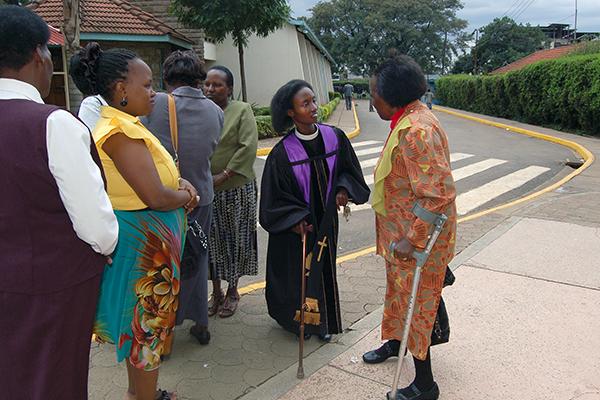On a Sunday at the Presbyterian church in the Bahati neighborhood, a young woman haltingly approaches the pulpit with a walking cane in one hand and a Bible in the other. Somewhere in her pocket is a mobile phone, which she uses to send out at least 400 Bible quotes a day to Christians across the city.
The Rev. Dawn Gikandi, 31, is a rarity here — a pastor who is a woman, a theologian, a social media devotee, and a disabled person in a country that stigmatizes people who are physically impaired.
In April, the Presbyterian Church of East Africa ordained Gikandi and sent her to her first post, Bahati Martyrs’ Church, where she and another pastor care for more than 4,000 congregants.
Since then, the news of her ordination has spread and become an inspiration to Kenya’s disabled community, where few such people get a chance to attend school, access good medical care, and receive emotional support, let alone professional advancement.
Here, disability is perceived as a curse. Stereotyping and social exclusion are some of the major problems facing people with disabilities, whether at home, school or work, said Anjeline Okola of the Ecumenical Disability Advocates Network.
Gikandi’s musculoskeletal condition stems from injuries her mother suffered during pregnancy when she was hit by a car as she was crossing a road in western Kenya.
The accident was so severe medical personnel who treated Gikandi’s mother recommended an abortion. They warned that the child born from this pregnancy would never walk and would likely suffer severe deformities.
“I have often felt my parents took a very difficult decision to give me the chance to live,” Gikandi said. “I was named Dawn, signifying their beginning of joy.”
The pastor wears a back brace tightened around her back to give it strength and uses a walking stick for stability. She says these do not stop her from enjoying her work. Gikandi is a dedicated servant of God who has chosen to remain single and give herself to her chosen vocation.
Like many a biblical prophet, Gikandi resisted her calling, enrolling at Kiriri Women’s University, where she studied mathematics for a year.
But, unable to find suitable housing, she left and enrolled at St. Paul’s University to study theology.
In 2006, she participated in the World Council of Churches assembly in Porto Alegre, Brazil, as youth leader. There she interacted with Christians and leaders from across the world and witnessed firsthand the “beautiful” work of the church, an encounter that led to her desire to study theology.
“The youth had a lot of personal questions about God and I wanted to be able to answer them,” Gikandi said.
While working with the youth she developed a habit, texting Bible quotes on her mobile phone. Sometimes she would send as many as 1,000 messages. Today she describes herself as a “texter.”
“Once in a while I would hear, ‘It got me when I was really down. I was in a tight position,’” she said.
“The same way social media has been used negatively, I have used it positively and I have seen it give positive results,” she added.
Most congregations fail to fully admit people with disabilities. Gikandi believes the first step is to help them address the physical structures that prevent people with physical challenges from attending.
“We have beautiful church buildings, but they are not friendly to disabilities,” she said. “The language is not friendly either,” she said, citing the absence of sign language.
Her challenge is to make church members experience God in a deeper way, through worship that meets their needs.
“I seek to make God real,” said Gikandi, who hopes to study for a master’s degree in systematic theology, as well as to travel, tweet, and text to reach out to more Christians, especially the youth.
Her mother, Purity Kubai, a high school English teacher, said Gikandi is very resilient person. If she believes she can accomplish a task, she does not stop until it’s done.
The ordination reflects the acceptance of the gifts that those with disabilities bring to the church, said Okola, the official from the Ecumenical Disability Advocates Network.
“This is a great inspiration for people with disabilities,” said Okola.
But for Gikandi, the calling is not just about the church’s willingness to accept and recognize people with disabilities.
Gikandi believes God, who made human beings in his image, is not limited to choosing able-bodied people for service.
“God,” she said, “can use anything or anybody for his work.”
Fredrick Nzwili writes for Religion News Service. Via RNS.
Got something to say about what you're reading? We value your feedback!
